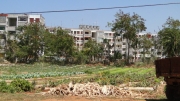Resilience at the margins: Stories of seed practices in the city gardens of Havana City, Cuba
There is a global decline in biological diversity; specifically, genetic erosion of our plant genetic resources (“PGR”) of agricultural crop plants (cereals, fruits, nuts, and food legumes). The twin impact of this genetic erosion is a cultural erosion which occurs when the PGR such as farmers varieties’ are lost. Impacts of this on seed systems tend to be studied in rural agriculture settings with few studies addressing the impact of a decline in PGR on seed sectors in urban settings. There is vast literature on urban agriculture, but not seed. Cuba is a country with a well established urban agriculture system and the presence of both informal and formal seed sectors. The current study explored the seed practices in city gardens of Havana City, Cuba to highlight the importance of seed practices as a factor to be taken into account in resilience studies. Specifically, the knowledge and memories of city gardeners in relation to seed were addressed against the theoretical frames of resilience studies and margins. It was found that permaculture communities in Havana City provide a useful connection between these two frameworks and that in general, city gardeners have knowledge and memories of seed practices. This suggests the potential to study seed systems within the urban setting and also the importance of both marginal spaces and marginal communities when assessing resilience, in particular the importance of seed practices as a factor to take into account.
Action researcher: Emily Dowding-Smith, MESPOM 2011

